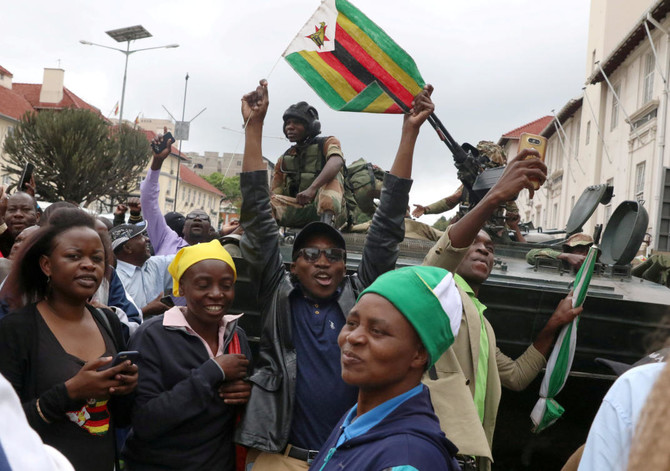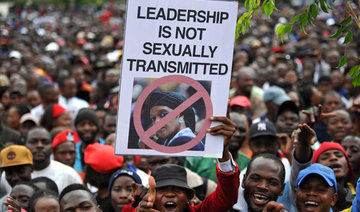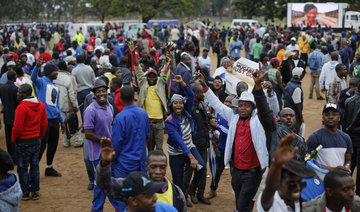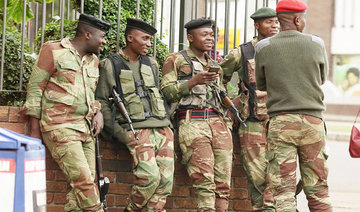HARARE: Zimbabwe’s ruling party will dismiss 93-year-old President Robert Mugabe as its leader on Sunday and kick him out, stripping its ruler for the last 37 years of one of his final vestiges of authority, the head of the liberation war veterans said.
Speaking to Reuters as he walked into an extraordinary meeting of ZANU-PF’s central committee, Chris Mutsvangwa said Mugabe was running out of time to negotiate his departure and should leave the country while he could.
“We are going all the way,” Mutsvangwa said. “He’s trying to bargain for a dignified exit.”
Mutsvangwa, who has spearheaded a campaign over the last 18 months to remove the only leader Zimbabwe has known, said ZANU-PF would also dismiss Mugabe’s wife Grace as head of its Women’s League and reinstate ousted vice president Emmerson Mnangagwa.
The former state security chief, known as “The Crocodile” is thought to be in line to head an interim post-Mugabe unity government that will focus on rebuilding ties with the outside world and stabilising an economy in freefall.
State television said late on Friday that Mugabe, who has so far resisted pressure to quit, would meet military commanders who seized power in a de facto coup four days ago, along with a Catholic priest who has been mediating between the two sides.
On Saturday, hundreds of thousands of people flooded the streets of Harare, singing, dancing and hugging soldiers in an outpouring of elation at Mugabe’s expected overthrow.
His stunning downfall in just four days is likely to send shockwaves across Africa, where a number of entrenched strongmen, from Uganda’s Yoweri Museveni to Democratic Republic of Congo’s Joseph Kabila, are facing mounting pressure to quit.
Men, women and children ran alongside the armored cars and troops who stepped in this week to oust the man who has ruled since independence from Britain in 1980.
Under house arrest in his lavish ‘Blue Roof’ compound, Mugabe has refused to stand down even as he has watched his support from party, security services and people evaporate in less than three days.
His nephew, Patrick Zhuwao, told Reuters the elderly leader and his wife were “ready to die for what is correct” rather than step down in order to legitimize what he described as a coup.
But on Harare’s streets, few seemed to care about the legal niceties as they heralded a “second liberation” for the former British colony and spoke of their dreams for political and economic change after two decades of deepening repression and hardship.
“These are tears of joy,” said Frank Mutsindikwa, 34, holding aloft the Zimbabwean flag. “I’ve been waiting all my life for this day. Free at last. We are free at last.”
The huge crowds in Harare have given a quasi-democratic veneer to the army’s intervention, backing its assertion that it is merely effecting a constitutional transfer of power, rather than a plain coup, which would entail a diplomatic backlash.
Despite the euphoria, some Mugabe opponents are uneasy about the prominent role played by the military, and fear Zimbabwe might be swapping one army-backed autocrat with another, rather than allowing the people to choose their next leader.
“The real danger of the current situation is that having got their new preferred candidate into State House, the military will want to keep him or her there, no matter what the electorate wills,” former education minister David Coltart said.
The United States, a long-time Mugabe critic, said it was looking forward to a new era in Zimbabwe, while President Ian Khama of neighboring Botswana said Mugabe had no diplomatic support in the region and should resign at once.
Zimbabwe’s ruling party to expel Mugabe, war vets head says
Zimbabwe’s ruling party to expel Mugabe, war vets head says

European leaders in Kyiv for show of solidarity against Russia

KYIV: The leaders of France, Britain, Germany and Poland were in Ukraine on Saturday for talks with President Volodymyr Zelensky, vowing to ratchet up pressure on Russia until it agreed a ceasefire in the three-year war.
The four countries, part of an alliance Britain and France have called “the coalition of the willing,” said in a joint statement they were “ready to support peace talks as soon as possible.”
The Kremlin has shown no signs of halting its invasion of Ukraine, despite US President Donald Trump pushing for a ceasefire, and warned earlier there could be no truce unless the West halted arms deliveries to Kyiv.
Russian President Vladimir Putin rejected a 30-day truce proposed by Washington and Kyiv in March, instead declaring two brief pauses in fighting that Ukraine has accused Moscow of violating.
On his way to Kyiv, French President Emmanuel Macron said that once a 30-day ceasefire was in place, there could be “direct talks between Ukraine and Russia.”
Both Moscow and Kyiv have hinted they are open to negotiating with each other but Ukrainian President Volodymyr Zelensky says this would only be possible once a ceasefire takes effect.
Russia has occupied about a fifth of Ukrainian territory since February 2022 and intensified deadly attacks on the country this spring.
The US embassy in Kyiv said on Friday that a “significant air attack” could occur at some point within the next several days.
Macron, German Chancellor Friedrich Merz and British Prime Minister Keir Starmer arrived together by train from neighboring Poland, where they joined Polish Prime Minister Donald Tusk.
It is the first time the leaders of the four European nations have made a joint visit to Ukraine.
They were seen embracing Zelensky and joined him in placing lanterns at a memorial for fallen soldiers in central Kyiv.
For Merz, who took office only this week, it will be his first visit to Ukraine as chancellor.
Macron had not been to Kyiv since June 2022, when he went with the Italian and German leaders of the time.
“We are clear the bloodshed must end. Russia must stop its illegal invasion,” the leaders said in a joint statement.
“Alongside the US, we call on Russia to agree a full and unconditional 30-day ceasefire to create the space for talks on a just and lasting peace.”
They warned: “We will continue to increase our support for Ukraine. Until Russia agrees to an enduring ceasefire, we will ratchet up pressure on Russia’s war machine.”
They are later scheduled to host a virtual meeting to update other European leaders on moves to create a European force that could provide Ukraine with security after the war.
Such a force “would help regenerate Ukraine’s armed forces after any peace deal and strengthen confidence in any future peace,” the leaders’ statement said.
Russia has said it will not tolerate any Western military presence in Ukraine once the fighting ends and has warned the proposal could spark war between Moscow and NATO.
PUTIN VICTORY PARADE
The symbolic show of European unity comes a day after Putin struck a defiant tone at a Moscow parade marking 80 years since victory in World War II.
In an interview with the ABC news channel on Saturday, Kremlin spokesman Dmitry Peskov said arms deliveries from Ukraine’s allies would have to stop before Russia would agree to a ceasefire.
A truce would otherwise be an “advantage for Ukraine” at a time when “Russian troops are advancing... in quite a confident way” on the front, Peskov said, adding that Ukraine was “not ready for immediate negotiations.”
Europe and Ukraine argue more pressure is needed on Russia to respond.
After meeting Tusk in France on Friday, Macron called for the speedy drafting of a US-Europe plan for the 30-day truce that would be backed by “massive economic sanctions” if one side “betrays it.”
Finnish President Alexander Stubb said at a meeting on Ukraine in Norway on Friday that the “United States has two sanctions packages on the table” and that countries were discussing action in the “banking and the energy sector.”
A French presidential official, who asked not to be named, said the visit just four days after Merz took office “demonstrates Europe’s unity, strength, and responsiveness. And it mirrors Putin’s celebrations.”
China ‘strongly’ urges India, Pakistan to avoid escalation

BEIJING: China on Saturday urged India and Pakistan to avoid an escalation in fighting, Beijing’s foreign ministry said, as the conflict between its two nuclear-armed neighbors spiralled toward full-blown war.
“We strongly call on both India and Pakistan to give priority to peace and stability, remain calm and restrained, return to the track of political settlement through peaceful means and avoid taking actions that further escalate tensions,” a statement by a foreign ministry spokesperson said.
Brazil’s Lula to visit China ahead of regional summit

- Beijing is Brazil’s biggest trading partner. Its exports to China reached more than $94 billion last year
BEIJING: Brazil’s president will begin a five-day trip to China on Saturday, Beijing announced, ahead of a gathering of Latin American leaders in the country next week.
Luiz Inacio Lula da Silva’s state visit comes at the invitation of counterpart President Xi Jinping and will last until Wednesday, a Chinese foreign ministry spokesperson said in a statement on Saturday.
Since returning to power in early 2023, Lula has sought to improve ties with both China and the United States.
Beijing is Brazil’s biggest trading partner. Its exports to China reached more than $94 billion last year, according to the United Nations Comtrade Database.
The South American agricultural power sends mainly soybeans and other primary commodities to China, while the Asian giant sells semiconductors, telephones, vehicles and medicines to Brazil.
The two presidents are expected to attend next week’s summit between China and the 33-member Community of Latin American and Caribbean States (CELAC).
China is seeking to replace the United States as the main political and economic external influence in Latin America, where leaders have urged a united front against President Donald Trump’s global tariff blitz.
Two-thirds of Latin American countries have joined Beijing’s trillion-dollar Belt and Road infrastructure program, and China has surpassed the United States as the biggest trading partner of Brazil, Peru and Chile, among others.
South Korean conservative party moves to switch presidential candidates as election turmoil deepens

- The replacement still requires confirmation through an all-party vote Saturday and approval by the party’s national committee Sunday
- Han and Kim have lagged well behind Lee in recent opinion polls. Lee, who spearheaded the Democrats’ efforts to oust Yoon
SEOUL, South Korea: South Korea’s embattled conservative party has taken the unprecedented step of nullifying its primary and replacing presidential candidate Kim Moon Soo with former Prime Minister Han Duck-soo just one week after Kim’s selection, deepening internal turmoil ahead of the June 3 presidential by-election.
Saturday’s move by the People Power Party’s leadership, which Kim denounced as an “overnight political coup,” underscores the desperation and disarray within the party following the ouster of former President Yoon Suk Yeol over his ill-fated attempt to impose martial law in December.
Kim, a staunch conservative and former labor minister under Yoon, was named the PPP’s presidential candidate on May 3 after winning 56.3 percent of the primary vote, defeating a reformist rival who had criticized Yoon’s martial law. But the PPP’s leadership, dominated by Yoon loyalists, has spent the past week pressuring Kim to step aside and back Han, whom they believe stands a stronger chance against liberal Democratic Party frontrunner Lee Jae-myung.
Han served as acting president after Yoon was impeached by the legislature in December and officially removed by the Constitutional Court in April. He resigned from office May 2 to pursue a presidential bid, arguing his long public service career qualifies him to lead the country amid growing geopolitical uncertainty and trade challenges intensified by the policies of US President Donald Trump.
After failed talks between Han and Kim to unify their candidacies, the PPP’s emergency committee canceled Kim’s nomination in the early hours of Saturday and officially registered Han as a party member and its new presidential candidate.
The replacement still requires confirmation through an all-party vote Saturday and approval by the party’s national committee Sunday, which is the deadline for candidates to register with the election authorities.
Han in a message issued through the party claimed “if we unite, we can surely win.”
Speaking at a news conference, Kim lamented “democracy in our party died” and vowed to take unspecified legal and political steps, but it remained unclear whether any realistic path existed to restore his candidacy without the party’s cooperation.
Kim had opposed the legislature’s impeachment of Yoon on Dec. 14, though he said he disagreed with Yoon’s decision to declare martial law on Dec. 3. Kim had gained popularity among hard-line PPP supporters after he solely defied a Dec. 11 demand by an opposition lawmaker that all Cabinet members stand and bow in a gesture of apology for Yoon’s martial law enactment at the Assembly.
Han and Kim have lagged well behind Lee in recent opinion polls. Lee, who spearheaded the Democrats’ efforts to oust Yoon, ridiculed the PPP efforts to switch candidacies, telling reporters Thursday, “I have heard of forced marriages but never heard of forced unity.”
Lee has long cultivated an image as an anti-establishment figure capable of tackling South Korea’s entrenched inequality and corruption. However, critics view him as a populist who fuels division and vilifies opponents, warning that his leadership could further polarize the country.
He currently faces five trials for corruption and other criminal charges. If he becomes president, those trials likely will stop because of special presidential immunity from most criminal charges.
Judge pauses much of Trump administration’s massive downsizing of federal agencies

- The order, which expires in 14 days, does not require departments to rehire people
SAN FRANCISCO: The Republican administration must halt much of its dramatic downsizing of the federal workforce, a California judge ordered Friday.
Judge Susan Illston in San Francisco issued the emergency order in a lawsuit filed by labor unions and cities last week, one of multiple legal challenges to Republican President Donald Trump’s efforts to shrink the size of a federal government he calls bloated and expensive.
The temporary restraining order directs numerous federal agencies to halt acting on the president’s workforce executive order signed in February and a subsequent memo issued by the Department of Government Efficiency and the Office of Personnel Management.
The order, which expires in 14 days, does not require departments to rehire people. Plaintiffs asked that the effective date of any agency action be postponed and that departments stop implementing or enforcing the executive order, including taking any further action.
They limited their request to departments where dismantlement is already underway or poised to be underway, including at the the US Department of Health and Human Services, which announced in March it will lay off 10,000 workers and centralize divisions.
Illston, who was nominated to the bench by former President Bill Clinton, a Democrat, said at a hearing Friday the president has authority to seek changes in the executive branch departments and agencies created by Congress.
“But he must do so in lawful ways,” she said. “He must do so with the cooperation of Congress, the Constitution is structured that way.”
Trump has repeatedly said voters gave him a mandate to remake the federal government, and he tapped billionaire Elon Musk to lead the charge through DOGE.
Tens of thousands of federal workers have been fired, left their jobs via deferred resignation programs or have been placed on leave as a result of Trump’s government-shrinking efforts. There is no official figure for the job cuts, but at least 75,000 federal employees took deferred resignation, and thousands of probationary workers have already been let go.
Lawyers for the government argued Friday that the executive order and memo calling for large-scale personnel reductions and reorganization plans provided only general principles that agencies should follow in exercising their own decision-making process.
“It expressly invites comments and proposals for legislative engagement as part of policies that those agencies wish to implement,” Eric Hamilton, a deputy assistant attorney general, said of the memo. “It is setting out guidance.”
But Danielle Leonard, an attorney for plaintiffs, said it was clear that the president, DOGE and OPM were making decisions outside of their authority and not inviting dialogue from agencies.
“They are not waiting for these planning documents” to go through long processes, she said. “They’re not asking for approval, and they’re not waiting for it.”
The temporary restraining order applies to departments including the departments of Agriculture, Energy, Labor, Interior, State, Treasury and Veteran Affairs.
It also applies to the National Science Foundation, Small Business Association, Social Security Administration and Environmental Protection Agency.
Some of the labor unions and nonprofit groups are also plaintiffs in another lawsuit before a San Francisco judge challenging the mass firings of probationary workers. In that case, Judge William Alsup ordered the government in March to reinstate those workers, but the US Supreme Court later blocked his order.
Plaintiffs include the cities of San Francisco, Chicago and Baltimore; labor group American Federation of Government Employees; and nonprofit groups Alliance for Retired Americans, Center for Taxpayer Rights and Coalition to Protect America’s National Parks.




















